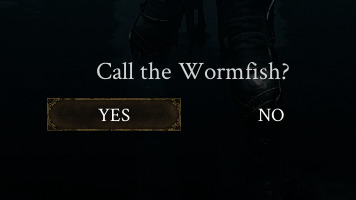Here’s a quick rundown, recreated to the best of my memory, of all the glowing, power-infusing objects I’ve shoved into my virtual body over the last 10 years, all while trying to get a leg up in video games inspired by FromSoftware’s
: Souls, obviously, the OG fuel for much-prized level-ups. But also:
.
.
.
.
.
.
.
.
.
. And, of course, Tar (short for Nektar), the progression currency underpinning the genre’s latest, and perhaps most aggressive, attempt to put a new dressing on its perverse brand of word salad: Cold Symmetry’s
.
To be clear: This is not a review of Mortal Shell, a game ambitious and strange in ways that run counter to the encroaching accessibility that the genre’s been wrestling with since, pretty much, Dark Souls 2. Hand-holding is minimal. Battles are slow and tension-inducing, with a single misstep often bringing crushing damage down on your playable character’s head. And the Wormfish? The Wormfish is always ready for your call.
Players are first introduced to this helpful pisco annelid during the game’s tutorial, which features the now-standard array of Vague Words being hurled at you, the inequitably wordless protagonist. (Did you know “Mortal Shells yearn for meaning?” They’re not the only ones!) Once you face off against the standard tutorial boss (who challenges you in a fog-shrouded, water-logged arena that’s just dripping with vagueness), your old pal Wormy-Fish swims up, devours you, and sends you into the game world proper. “Who was that dashing fellow?” you’ll find yourself asking. “He seems like an important part of this very comprehensible plot!”
Tragically, you’ll spend the next several hours without the accompaniment of your boon companion—during which time you’ll hear all about Foundlings, the Revered, Glimpses, Tar, Insights, and the all-important Sacred Glands. (The Glands are key. You gotta get some Glands.) But then, wonder of wonders, you find yourself back in the tutorial area—via the very simple procedure of walking up to a book on a podium and hitting a prompt marked “Recite,” which causes your character to tear a page out, which then turns into a spider, and then you fall asleep—and there he is! Even better, if you lose to the boss, you’re then presented with one of the most amazing text prompts in all of modern gaming.
It might sound like we’re making fun of the bargain basement literary ambiguity that sticks to this genre like a fog (or possibly Fog), all because the first game to tread these waters was made by people who knew how to wield this kind of subtlety with some measure of actual precision. It might sound like we’re making fun of a story that appears to have been generated by writing a full narrative, and then stripping things out until the dopey transcends into mysterious. It might sound like we’re bemoaning the fact that there’s not one single one of these fucking games that just spells out the basic point of what you’re doing before you’re like a dozen hours in, instead obfuscating it behind a hundred layers of proper nouns and vaguely sinister voice acting.
But no: We just really like getting to call the Wormfish. (Or, at least, having the option to do so.) In fact, we’d like to formally call for all developers to consider giving players, at some point in their game, the chance to make that exact same choice. Mario’s feeling run down? Ask him if he wants to call the Wormfish. Sonic needs a lift? CTW-F, bay-be! Hell, every Metal Gear Solid has like 200 unused codec frequencies; ya’ll can’t let the Wormfish have one?


 Keep scrolling for more great stories from A.V. Club.
Keep scrolling for more great stories from A.V. Club.